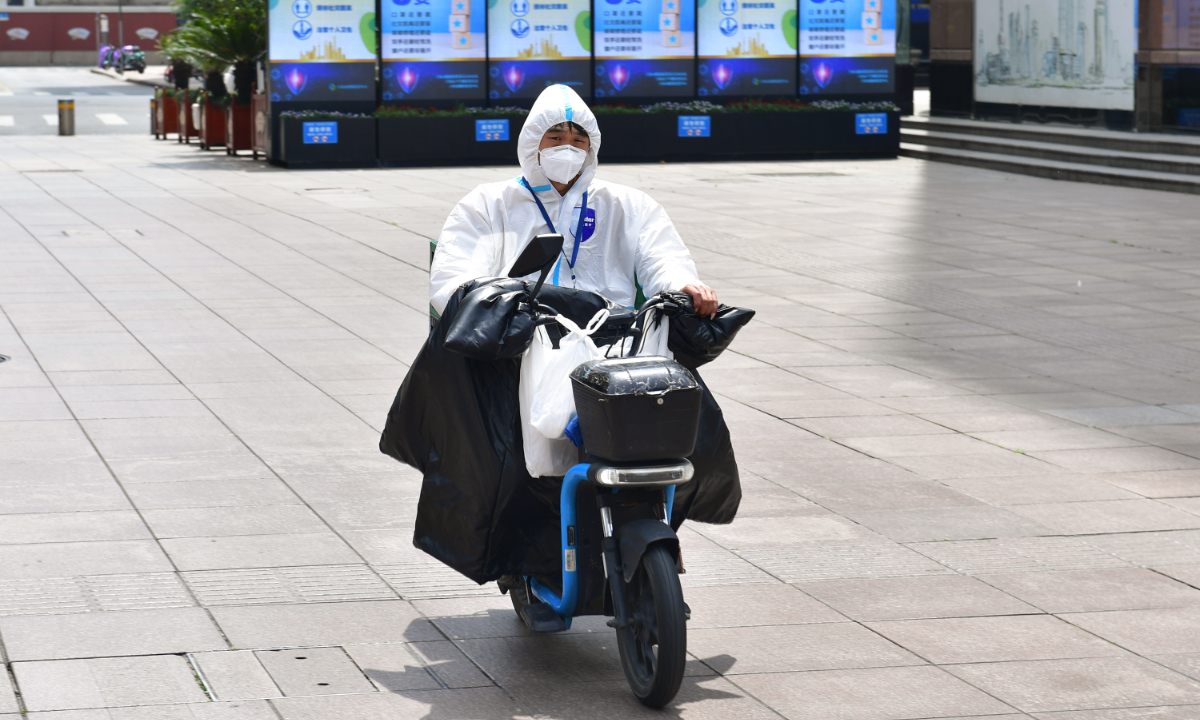
A delivery man delivers goods in Shanghai on April 10, 2022. Photo: VCG
At a time when many Chinese cities are being hit by COVID-19, the possibility of transmission of the virus from objects to humans is also coming into the public spotlight as a number of cities have reported infections on courier workers. Experts remind the public to carefully conduct disinfection after receiving parcels.
For the Omicron variant, if the surface of an object is smooth, such as glass, stainless steel or plastic, the virus can be detected days or weeks after contamination. Low temperature, humidity and a confined environment can provide the virus a better environment for survival, said Yu Chuanhua, professor of epidemiology and health statistics at Wuhan University, the People's Daily reported.
Yu's claim was echoed by other experts. "The Omicron variant currently prevalent can survive outside the body for more than 72 hours," an immunology expert told the Global Times on Thursday on condition of anonymity.
On Wednesday, seven courier workers in a logistics park in Taiyuan, capital of North China's Shanxi Province, tested positive for COVID-19. In Shuozhou, a courier also tested positive. On the same day, all postal and courier services in the province were ordered to suspend operations.
On Wednesday night, the Shanxi Postal Administration requested the resumption of express delivery services other than those involved in the virus spread chain.
This is not the first time China reported COVID-19 infections on courier workers. In March, dozens of infections among courier transit workers were reported in Hangzhou, East China's Zhejiang Province. This outbreak is believed to be caused by the couriers infected with parcels sent from abroad who then infected other people.
Shanghai, Jinhua in Zhejiang, Wuhan in Central China's Hubei Province, Shijiazhuang in North China's Hebei Province, and Hohhot, in North China's Inner Mongolia Autonomous Region, also reported confirmed cases in postal and courier workers in March.
In 2021, many cities also reported infections caused by imported cold-chain food and some cities reported cases which are believed to be caused by documents or other items sent from abroad.
Since the beginning of the epidemic, China has been adopting very strict regulations regarding express shipments, especially cross-border consignments.
To minimize the occurrence of similar infection chains, China has adopted very strict measures, including multiple disinfection of packages sent from abroad, prolonged resting time before delivery, requiring vaccinations and frequent testing of courier workers, and requiring recipients to test for COVID-19 upon receiving the parcel.
With these measures in place, the recent outbreaks caused by object-to-human transmission also suggests the possibility of increased survival time of the virus on inanimate objects, immunologists noted.
However, experts have also tried to ease public concerns among repeated reports of infections among courier workers.
It is still less likely that the general public will be directly infected by receiving a package, the expert noted. The more likely scenario is that a courier becomes infected because of contact with a positive object or environment and causes further transmission.
For the public, the way to reduce the risk is to minimize the use of couriers during an outbreak, especially to reduce the contact with couriers from areas at high risk of an outbreak, the immunologist suggested.
For deliveries received, it is best if they can be left in a special area for a period of time before being disinfected and then opened. "But even more important to be concerned about are the persons delivering the goods," he said.
Many cities have paid attention to and implemented management approaches to the chain of object-to-human transmission that has raised public alarm.
In Shanghai, where many residential areas have been put under lockdown for about three weeks, the city's health authorities pointed out the risk of residents being infected by deliveries.
"It could be possible that residents could be infected by goods contaminated with COVID-19," Wu Huanyu, Deputy Director of the Shanghai Center for Disease Control and Prevention said at Thursday's press briefing.
A 41-year-old local resident in Shanghai's district of Jing'an told the Global Times on Thursday that he always disinfects the parcels first when receiving them.
"Our community encourages us not to participate in group buying without legal channels as contaminated goods could also be a source to spread virus," the resident said.
"When the goods are delivered at the entrance of the residential community, we disinfect them before sending them to each home," a 28-year-old volunteer resident in Xuhui district who works part time to help delivery goods told the Global Times, adding that "we also remind residents in our community to disinfect the packages outside before opening them."




